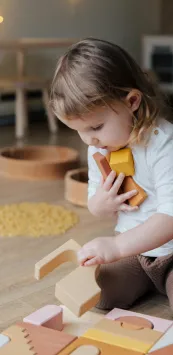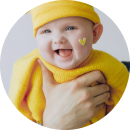Understanding Cerebral Palsy
Cerebral Palsy (CP) is a group of neurological conditions that affect a child’s movement and posture. It results from damage to the developing brain, often before or during birth, and can impact a child’s ability to control their muscles. The condition varies significantly from child to child – some may have mild difficulties with coordination, while others may require support with all daily activities.
At South West Kids Clinic, we take a personalised, holistic approach to therapy. We focus on what your child can do and how we can support them to build strength, confidence, independence, and joy in their daily life. We work alongside families to celebrate milestones, navigate challenges, and create a nurturing space for your child to thrive.
What is Cerebral Palsy?
Cerebral Palsy is not a single condition – it’s a spectrum. It may affect one side of the body (hemiplegia), both legs (diplegia), or the whole body (quadriplegia), and may involve muscle stiffness (spasticity), poor coordination (ataxia), involuntary movements (dyskinesia), or a combination of these.
Signs & Symptoms
Children with Cerebral Palsy may present with:
- Motor delays: Difficulty reaching milestones such as rolling, sitting, crawling, or walking.
- Muscle tone differences: Rigid or floppy muscles, or a combination of both, making movement more effortful.
- Balance and coordination issues: Impacting safe mobility and participation in play.
- Fine motor challenges: Difficulty using hands and fingers for self-care, play, and school tasks.
- Feeding and swallowing issues: Due to poor oral motor control.
- Speech and language delays: Difficulties with clear speech, understanding, and expressive communication.
- Pain or fatigue: Especially with movement or certain positions.
- Sensory sensitivities or regulation difficulties: Struggling to maintain calm, alert states for learning and participation.
Every child’s experience with CP is different, so our therapy programs are tailored to your child’s unique strengths, needs, and goals.
Causes & Risk Factors
Cerebral Palsy occurs due to damage to the developing brain. This can happen during pregnancy, during birth, or shortly after birth due to factors like:
- Premature birth
- Low birth weight
- Lack of oxygen during delivery
- Brain infections or injuries in infancy
While some risk factors are known, in many cases the exact cause remains unknown. What matters most is early support and consistent intervention.
Personalised Therapy Solutions We Can Implement
Physiotherapy for Cerebral Palsy
Physiotherapy is essential for children with CP to support their mobility, posture, and participation. We work on achieving motor milestones, improving balance, coordination, and preventing secondary complications like joint stiffness and muscle tightness.
Our physiotherapists offer:
- Functional, goal-directed therapy
- Dynamic Movement Intervention (DMI) intensive therapy
- Spider cage therapy
- Pediasuit intensive programs
- Equipment prescription (walkers, wheelchairs, orthotics)
- Aquatic physiotherapy
- Pre and post-surgical rehab
- 24-hour positioning strategies
- Family coaching and home program development
Occupational Therapy for Cerebral Palsy
Occupational therapists help children with CP gain independence in everyday activities – dressing, feeding, playing, toileting, and learning. We also support with adaptive equipment and environmental modifications to increase participation at home and school.
Our occupational therapists provide:
- Comprehensive assessment of motor and developmental skills
- Assistive technology support
- Cognitive Orientation to daily Occupational Performance (CO-OP Approach)
- School readiness and transition support
- Hand function and upper limb rehab
- Splinting and upper limb positioning
- Task adaptation and graded progression
- Parent/caregiver coaching
Speech Pathology for Cerebral Palsy
Speech pathologists assist children with CP who may have challenges with communication, speech clarity, and feeding. Therapy may include both verbal and non-verbal methods to ensure every child can express themselves and engage socially.
Our speech pathologists provide:
- Speech and language assessments
- Augmentative and Alternative Communication (AAC) support (including Key Word Sign, devices, and eye gaze)
- Oral motor and feeding support
- Play-based language therapy
- Parent coaching
Dietetics for Cerebral Palsy
Children with CP may experience nutritional challenges due to feeding difficulties, reduced activity levels, or high energy needs. Our dietitians work closely with families to promote healthy growth and support feeding and digestion.
Our dietitians offer:
- Feeding plans tailored to oral motor skill level
- Nutritional support for children with growth concerns
- Strategies to manage constipation or reflux
- Guidance on texture modifications
- Support for tube-fed children and transition planning
Why choose South West Kids Clinic to help your child with Cerebral Palsy?
At South West Kids Clinic, our collaborative and experienced team offers:
- A warm and inclusive environment for families and children
- Multidisciplinary therapy tailored to your child’s goals
- Access to specialist programs and advanced rehabilitation equipment
- Intensive therapy options
- Ongoing parent coaching to support therapy in everyday life
We’re here to partner with you – every step of the way.
Support for families with a child with Cerebral Palsy
In addition to the services we provide, the following organisations are a great source for parents looking for more guidance in other areas provided by South West Kids Clinic:
- Raising Children Network – Cerebral Palsy
- Cerebral Palsy Alliance
Frequently asked questions
When should my child start therapy for Cerebral Palsy?
Early intervention is vital. Starting therapy soon after diagnosis helps develop motor and communication skills, prevents secondary issues, and lays the foundation for independence. We tailor our therapy approach to your child’s developmental stage and needs.
How do I know which therapy my child needs most?
Our team will conduct a comprehensive assessment and collaborate with you to create an individualised plan. Depending on your child’s goals, this might include physiotherapy, occupational therapy, speech pathology, and/or dietetics.
Will my child need assistive equipment, and how do we access it?
Many children with CP benefit from equipment like walkers, orthotics, or communication devices. Our therapists assess, prescribe, and support families to access this through NDIS or other funding avenues.
Can you help coordinate multiple therapies?
Yes. We’re a multidisciplinary team that values collaboration. We plan together to ensure your child’s therapies complement each other and align with their goals. We also work with schools and other providers where appropriate.
What kind of progress should I expect?
Progress looks different for every child. We set meaningful, achievable goals and regularly review them. We focus on building skills for daily life, celebrating every milestone along the way – big or small.







